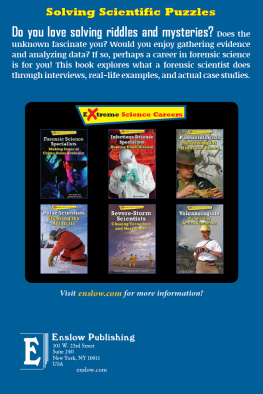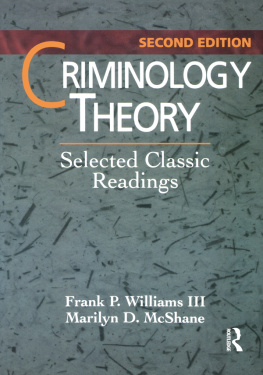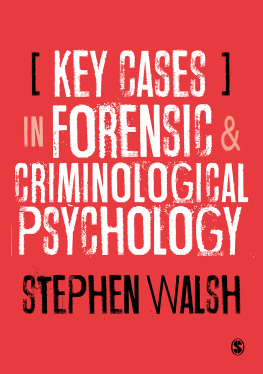Forensic Criminology
This text provides an examination of the aetiological development of forensic criminology in the UK. It links the subjects of scientific criminology, criminal investigations, crime scene investigation, forensic science and the legal system and it provides an introduction to the important processes that take place between the crime scene and the courtroom. These processes help identify, define and label the criminal and are crucial for understanding any form of crime within society. The book includes sections on:
the epistemological and ontological philosophies of the natural sciences;
the birth of scientific criminology and its search for the criminal body;
the development of early forms of forensic science and crime scene investigation;
investigating crime;
information, material and evidence;
crime analysis and crime mapping;
scientific support and crime scene examination; and
forensic science and detection methods and forensics in the courtroom.
The text combines coverage of historical research and contemporary criminal justice process and provides an introduction to the most common forensic practices, procedures and uses that enable the identification and successful prosecution of criminals. Forensic Criminology provides a framework for understanding the varieties of information work that exist within current criminal justice practice.
Forensic Criminology is essential for students of criminology, criminal justice, criminal investigations and crime science. It is also useful to those criminal justice practitioners wishing to gain a more in-depth understanding of the links between criminology, criminal investigations and forensics techniques.
Andy Williams is Principal Lecturer and Programme Area Leader in the Institute of Criminal Justice Studies at the University of Portsmouth. His main research areas are forensic criminology; forensic techniques and their uses and interpretation in court; dangerous offenders; public protection and offender profiling. His previous books include: The Anatomy of Serious Further Offending (Oxford University Press, with Mike Nash); The Handbook Of Public Protection (Willan, co-edited with Mike Nash); and The Myth of Moral Panics (Routledge, with Bill Thompson).
This long-awaited book will become part of the foundational literature in forensic criminology. It is essential reading for students, practitioners, and academics who wish to fully appreciate the interplay between theoretical/substantive criminology and the practical world of forensic science, as well as everyday investigative and legal decision-making. Fortunately for both criminal justice professionals and general citizenry alike, the gap between theory and practice has just been substantially narrowed.
Daniel B. Kennedy, Ph.D., Oakland University and President, Forensic Criminology Associates, Inc., USA
This is a very timely and important book for the progression of forensic criminology. It uses an impressive array of literature and sources to provide a rigorous and robust overview of the historical and theoretical contexts that underpin contemporary forensic practice and relevant criminology. It demonstrates the tangible links between the evolution of criminological thought and its utilisation in forensic practice without adhering to a formulaic description of tasks, science and technologies. Instead, this book offers an interesting and insightful overview of developments in regards to the relevant science, techniques and ideologies, which is augmented by a detailed commentary on their underlining application and development.
Dr Paul Smith, Institute of Criminal Justice Studies, University of Portsmouth, UK
A useful point of reference for all students of forensic criminology. This book concisely summarises historical developments and research through to current thinking in a logical framework from crime scene to court room.
Terry Lowe, Head of Scientific Services Department, Hampshire Constabulary, UK
First published 2015
by Routledge
2 Park Square, Milton Park, Abingdon, Oxon, OX14 4RN
and by Routledge
711 Third Avenue, New York, NY 10017
Routledge is an imprint of the Taylor & Francis Group, an informa business
2015 Andy Williams
The right of Andy Williams to be identified as author of this work has been asserted by him in accordance with sections 77 and 78 of the Copyright, Designs and Patents Act 1988.
All rights reserved. No part of this book may be reprinted or reproduced or utilised in any form or by any electronic, mechanical, or other means, now known or hereafter invented, including photocopying and recording, or in any information storage or retrieval system, without permission in writing from the publishers.
British Library Cataloguing-in-Publication Data
A catalogue record for this book is available from the British Library
Library of Congress Cataloging in Publication Data
Williams, Andy, 1973
Forensic criminology / Andy Williams.
pages cm
1. Forensic sciences. 2. Criminology. 3. Criminal investigation. I. Title.
HV8073.W52537 2014
363.250941dc23
2014005573
ISBN13: 978-0-415-67267-2 (hbk)
ISBN13: 978-0-415-67268-9 (pbk)
ISBN13: 978-0-203-10114-8 (ebk)
Typeset in Times New Roman
by Keystroke, Station Road, Codsall, Wolverhampton
This has been a difficult book to write and has taken much longer than expected. Thanks go to Routledge for putting up with constant deadline changes that stretched over a year. Particular thanks go to Nicola and Heidi for their immense patience.
I would like to thank key members of the University of Portsmouth, who were open enough to see the potential in developing a forensic strand to an already impressive criminal justice department; and who also gave me the space to develop the Criminology and Forensic Studies course as well as help me through the early sociopathic years. In particular I would like to thank Mike Nash, Steve Savage and Dave Russell for all their support; and Val and the admin girls who are the best and covered my ass on many occasions! Merging practical policing with academic social science is always difficult, but, with the help of ex-practitioners, it has been fun; and over the last seven years it has been great working with a good bunch of insiders. Thanks go to Paul, Adrian, Brian and Claire; I hope you have learned as much from me as I have from you (academics are not entirely useless). I would also like to say a big thanks to all the undergraduate Criminology and Forensic Studies students who have passed through the door: you have been entertaining and every day remind me why I do the job I do. Particular thanks to PT and KH for all their help over the last year; a debt I can only repay through copious amounts of wine and pool (102)!
As ever, Eve has been my guiding force of strength; as well as providing me with the necessary breaks whilst putting up with the never-ending story that has been this book. Thanks to Mazzy and Star for constantly stopping my work at the most inconvenient times.







